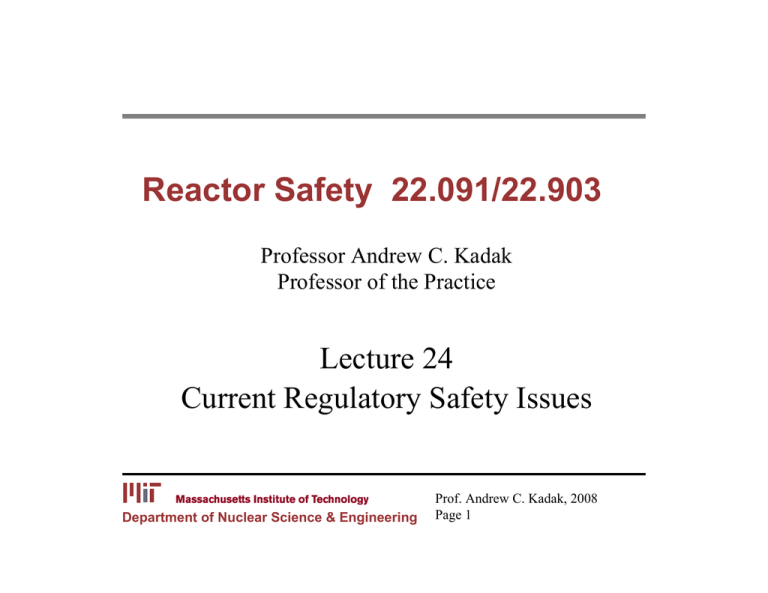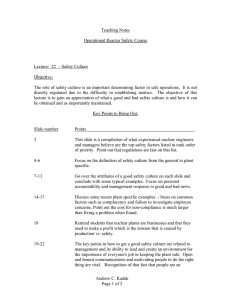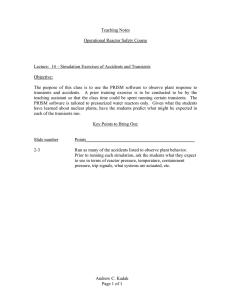
Reactor Safety 22.091/22.903
Professor Andrew C. Kadak
Professor of the Practice
Lecture 24
Current Regulatory Safety Issues
Department of Nuclear Science & Engineering
Prof. Andrew C. Kadak, 2008
Page 1
Topics to Be Covered
• Reactor Vessel Integrity – Embrittlement
• PWR Sump Performance
• Reactor Coolant System Weld Issues
• Davis Besse Head Degradation
• Fire Protection (Hemyc Insulation)
• Plant Security and Terrorism
• Ground water contamination – tritium
• Safety Conscious Work Environment – Safety Culture
– Human Factors
Department of Nuclear Science & Engineering
Prof. Andrew C. Kadak, 2008
Page 2
Reactor Vessel Integrity
• Driven in part by Yankee Rowe Vessel Issue
• Depending on weld and metal materials some vessels
vulnerable to embrittlement
• Need to have in reactor specimens to gauge degree of
embrittlement
• Reactor have chosen to manage fuel differently – low
leakage cores
• Only major life limiting component in reactors
Department of Nuclear Science & Engineering
Prof. Andrew C. Kadak, 2008
Page 3
PWR Sump Performance
• During a LOCA debris from
paint, insulation and other
materials will clog sump
screens
• Failing or cavitation
recirculation spray
• Net Positive Suction Head
insufficient
• Similar to BWR issue
Department of Nuclear Science & Engineering
Prof. Andrew C. Kadak, 2008
Page 4
Source unknown. All rights reserved. This content is excluded from our Creative Commons license.
For more information, see http://ocw.mit.edu/fairuse.
Reactor Coolant System Weld Issues
• Primary Water Stress
Corrosion Cracking
• Alloy 82/182/600 welds
• Temperature, residual
stresses, Nickel based alloys
• Plants: Wolf Creek, V.C.
Summer, South Texas
Project, Crystal River 3, etc.
• Solution – inspection and
weld overlay
Department of Nuclear Science & Engineering
Prof. Andrew C. Kadak, 2008
Page 5
Source unknown. All rights reserved. This content is excluded from our Creative Commons license.
For more information, see http://ocw.mit.edu/fairuse.
Fire Protection
• Objective to prevent fires and failures due to fires that
affect safety of the plant
• Appendix R – governing regulation
• Required separation of trains
• Insulation – fire doors – fire watches
• Fire PRAs being developed
• Problems with tests of some insulation – Hymec failing to
meet NRC fire retardant time issue.
Department of Nuclear Science & Engineering
Prof. Andrew C. Kadak, 2008
Page 6
Security and Terrorism
Aircraft Crash
Upgrade to physical security
Design Basis Threat – Force on Force
Department of Nuclear Science & Engineering
Prof. Andrew C. Kadak, 2008
Page 7
Ground Water Contamination
• Water leaks containing tritium
• Big issue at Brookhaven National Lab – changed lab
• Leaks in water systems at Indian Point, Braidwood,
Callaway, Dresden, Bryon, Palo Verde, Quad Cities
• Leaks frequently coming from spent fuel pool liners.
• Public outcry
• Reporting requirements refined
• Levels of tritium still low within limits.
Department of Nuclear Science & Engineering
Prof. Andrew C. Kadak, 2008
Page 8
Department of Nuclear Science & Engineering
Prof. Andrew C. Kadak, 2008
Page 9
Recent Enforcement Actions
Reactor Actions
Exelon Generation Company, LLC (Byron Station) EA-08-046
On April 1, 2008, a Notice of Violation (NOV) was issued for violations associated with a White
Significance Determination Finding. The NOV involved violations of 10 CFR Part 50, Appendix B
Criterion XVI, “Corrective Actions”, and 10 CFR Part 50, Appendix B, Criterion III, “Design
Control”. Specifically, the licensee failed to take timely corrective actions after the
identification of extensive corrosion on essential service water riser pipes and failed to verify
the adequacy of the methodology and design inputs in calculations that supported the decision
to accept three degraded essential service water riser pipes for continued service.
Source unknown. All rights reserved. This content is excluded from our Creative Commons license.
For more information, see http://ocw.mit.edu/fairuse.
Appendix B violation – Quality
Department of Nuclear Science & Engineering
Prof. Andrew C. Kadak, 2008
Page 10
Enforcement Action
Luminant Generation Company, LLC (Comanche Peak Steam Electric Station) EA-08-028
On February 29, 2008, a Notice of Violation was issued for a violation associated with a White
Significance Determination Finding involving a violation of the Unit 1 Technical Specification
(TS) 3.8.1, “AC Sources - Operating,” which requires that while the plant is in Modes 1, 2, 3,
or 4, two diesel generators (DGs) capable of supplying the onsite Class 1E power distribution
subsystem(s) shall be operable. From November 1, 2007, through November 21, 2007, while
the plant was in Mode 1, one of the two DGs capable of supplying the onsite Class 1E power
distribution subsystem(s) was inoperable, and action was not taken to either restore the DG to
an operable status within 72 hours or be in Mode 3 within 6 hours and Mode 5 within 36 hours
Specifically, Emergency Diesel Generator (EDG) 1-02 was made inoperable as a result of
painting activities due to paint having been deposited and remaining on at least one fuel rack
in a location that prevented motion required to support the operation of the EDG. This
condition caused EDG 1-02 to fail to start during a surveillance test on November 21, 2007
Source unknown. All rights reserved. This content is excluded from our Creative Commons license.
For more information, see http://ocw.mit.edu/fairuse.
Department of Nuclear Science & Engineering
Prof. Andrew C. Kadak, 2008
Page 11
Summary
• Even though nuclear plants are performing to high
capacity levels for the last 5 years - issues remain.
• Safe operation requires constant vigilance, attention to
detail and strong NRC oversight to assure that
complacency does not set in.
• Role of industry NEI and EPRI are important to
resolution of generic issues to assure balance.
Department of Nuclear Science & Engineering
Prof. Andrew C. Kadak, 2008
Page 12
MIT OpenCourseWare
http://ocw.mit.edu
22.091 Nuclear Reactor Safety
Spring 2008
For information about citing these materials or our Terms of Use, visit: http://ocw.mit.edu/terms.




